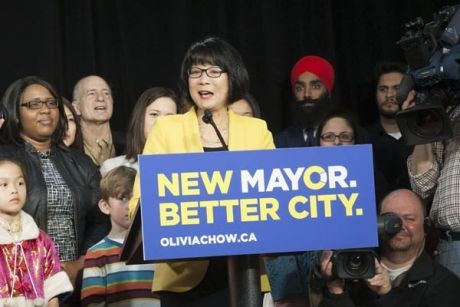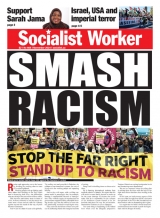What we think
You are here
Toronto: how can the election of new mayor make a better city?

March 31, 2014
Toronto mayor Rob Ford won a landslide election four years ago, but now faces a half-dozen right-wing challengers—while Olivia Chow has given people hope that we’ll have a left-wing alternative to vote for. How can the election of a new mayor make a better city?
After four years of austerity, people in Toronto are craving a new mayor. But until now the only alternatives to Rob Ford in the fall’s mayoralty race are people who support his policies—right-wing councilors Karen Stintz, former right-wing councilor David Soknacki, former provincial Tory leader John Tory, and now previous right-wing mayoral candidate and CEO Sarah Thomson.
The entry of prominent NDP member Olivia Chow has given hope that a better Toronto is possible. She is a lifelong lefty who has supported countless struggles. People see her as the candidate of the 99%, and even before entering the race she has started off as the front-runner. But much could change. Here are a few questions to keep in mind while navigating the electoral race.
Why was Ford elected?
To replace Ford we need to understand why he was elected in the first place, which caught make off guard and led to the narrative that Toronto had surged to the right—driven by a reactionary “Ford Nation.” If this were the case than any candidate would feel pressured to appeal to this supposed right-wing mood. But the election of Ford paradoxically followed two mass displays of resistance—the city workers strike in 2009 and the G20 protest in 2010. A left-wing candidate supporting and reflecting these movements could have won the mayoralty and helped magnify the movements.
But mayor David Miller and other “left-wing” councilors forced city workers to strike and opposed them, and then passed a motion congratulating the police after the largest mass arrest in Canadian history at the G20. The silence on council left the right-wing reaction unopposed, which Ford rode into office, but he had to mask his agenda under populist slogans of “respect” and going after the “gravy train.” He was the only candidate who reflected, in contradictory ways, people’s frustrations during the economic crisis. The left-wing candidate, Joe Pantalone, did not distinguish himself from Miller or mobilize a left-wing alternative, and lost. If we want to avoid another right-wing populist mayor we need a clear left-wing alternative.
What is Ford’s agenda?
A left alternative to Ford needs to be clear about why it is opposed to Ford. Ford attacked workers—revoking transit workers right to strike, privatizing garbage collection, imposing concessions on city workers and going after library workers. Ford cut services, burying a mass transit plan and using the private corporation KPMG to target everything from housing to children’s programs. Ford’s policies disproportionately affect oppressed groups, and he has gone out of his way to promote homophobia as a scapegoat for austerity—from refusing to attend Pride to trying to remove the rainbow flag at City Hall.
It was a clear left-wing response outside council—including three mass rallies, two marathon deputations and a library workers strike that won public support—which exposed and challenged Ford’s agenda in the first year of his term. This significantly eroded his support and created rifts on council—encouraging left-wing councilors to speak out, but also giving rise to opportunistic right-wing councilors like Stintz.
More recently the level of struggle has been low, and the dominant reaction to Ford’s scandals buried his agenda, deflected criticism from his policies to his behavior outside council, and allowed right-wing councilors to pose as alternatives. As Stintz said the day she announced her candidacy, “I believe in the fiscal agenda of Rob Ford.” Left-wing politicians have got caught up in the scandal hysteria, focusing on the Ford “circus” rather than his scandalous policies that other right-wing candidates support.
How can we make a better city?
A better city starts with reversing Ford’s policies—reviving a mass transit expansion and restoring transit workers right to strike, restoring cuts to services, and supporting city workers and Pride. There’s a clear desire for an alternative to Ford’s agenda, expressed through rallies, deputations and strikes. More recently there have also been other resistance movements in the city—from Idle No More and sanctuary city, to the $14/hr minimum wage and opposition to Line 9. All this provides a clear left-wing platform of economic, social and climate justice—which a left-wing candidate could use to amplify the movements outside City Hall.
But despite Olivia chow’s record and link with movements, it’s not clear her campaign will reflect them. Instead it is emphasizing her “track record of promoting small businesses” and that she “balanced budgets with (right-wing) Mayor Mel Lastman.” Like the provincial NDP who refuse to support a $14/hr minimum wage, chasing the small business vote leads away from the working class base of the NDP—while a focus on “balanced budgets” leads away from jobs and services that are often the only things on the chopping block.
What is the role of the election of a new mayor?
The election of Rob Ford and the years since then have shown that the greatest resistance to austerity comes from outside council, but that elections and elected officials can make a difference—either undermining these struggles by not supporting them, or magnifying them by giving them voice.
The NDP federally was catapulted into official opposition in the hopes of an alternative; but since then the NDP has campaigned and ruled to the centre—losing support to the federal Liberals while getting booted out of office in Nova Scotia after imposing austerity. At the same time the rising support for Québec solidaire, and the election of Seattle’s socialist city councilor Kshama Sawant, show how left-wing alternatives can combine the ballot box and the streets/workplaces.
We should vote for the one left-wing candidate, but also try to use the mayoral race to strengthen all the movements outside City Hall that will need to continue regardless who is elected.
Section:










